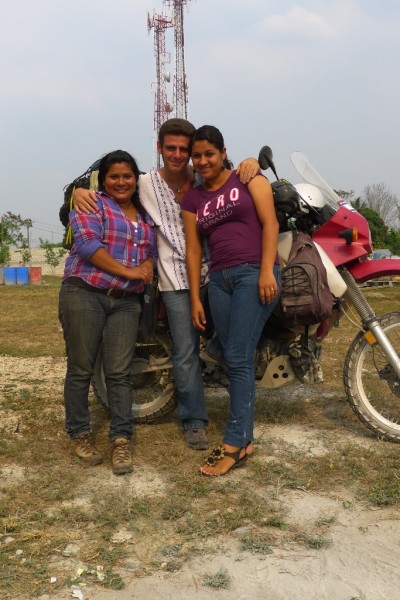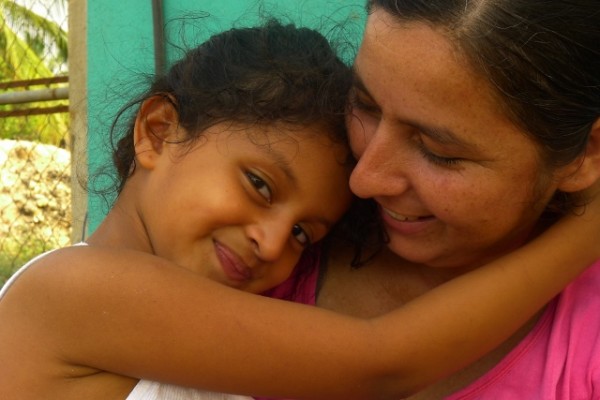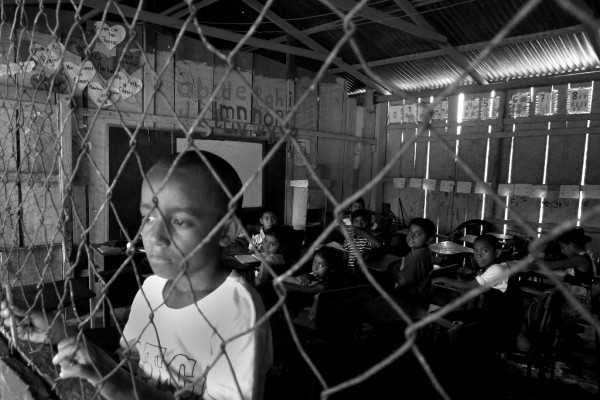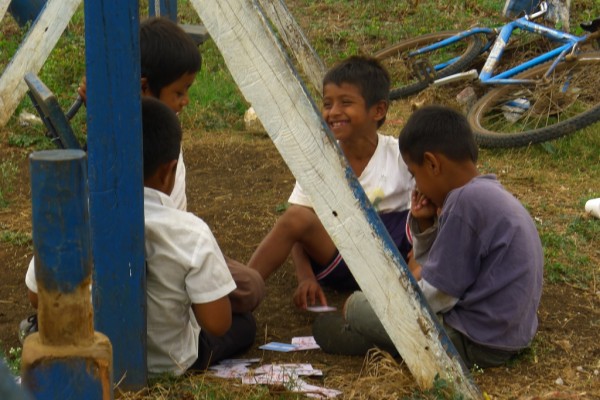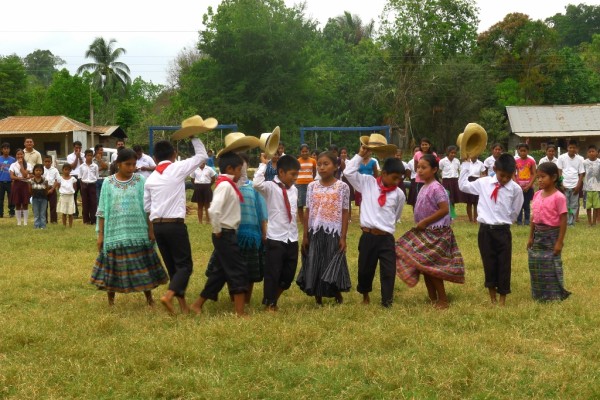Maria
A few years ago, while still teaching in New York, I helped a friend with a fundraiser for a Guatemala based NGO, which for some reason sparked a desire to come and see things for myself. If nothing else, this crazy journey of mine has made so many of my dreams come true – which included experiencing Guatemala. I say experiencing rather than seeing because there are two ways of going about being present in this country: one is staying on the Gringo Trail, which will bring you to beautiful places and colorful markets, but will ensure that you see practically nothing of the real Guatemala or life there; the second option is to dive head first into one of the poorest countries on earth with a bloody history that began with the conquistadors and ended only a few years ago at the end of the last civil war. Travelers love Guatemala for the beauty of its lakes and volcanoes, the vibrant colors of dresses and markets, and the pennies it costs to stay here. But few dare to venture beyond the Gringo Trail, and giving them the benefit of the doubt, the danger is what keeps them at bay. Extreme poverty, to a large extent brought on by American corporations and the CIA (as in most of Central America), means a high prevalence of armed robbery – on buses, on the roads, and on the streets. Recently unemployed guerilla fighters with little to do is another good reason to hug that trail. But I am no tourist, and so I sought the poorest corners, the most dangerous roads, and was rewarded with moments and people I will always hold dear.
Coming in from Belize, I entered El Peten – the largest state, the poorest state, and the most replete with incredible Mayan ruins. My mind being saturated by the ruins of Mexico, I sought only the people, only the more recent history of Guatemala. And, thanks to couchsurfing, I found it right away, and to an extent and intensity of which I never dreamed.
My education began on my very first days in El Peten. My host, Maria, who works as a women’s rights and education advocate in a newly formed municipality, helped me see what few others could. Maria belongs to a club more exclusive than the richest Spanish clubs of the capital – she is an educated woman from the country. In a land where the majority of girls are married by 16, and well into motherhood by 18, Maria stands out as a shining beacon to the power of reading and education. In a homophobic, fanatically catholic, patriarchal society, Maria loves all, centers her faith on humanity, and works actively to empower and educate women. And I met her, I stayed in her home, I bore witness to what is possible.
A few years ago one of the neighboring mother’s died, leaving a 9 year old girl in the “care” of her older siblings. After a few years of using Tarol as a maid and servant, they decided they no longer wanted her around. Maria, barely in her 20’s at the time, adopted Tarol, and gave her not only a home, but the opportunity to go to school, to have a life and a real future. Soon after, Maria graduated with her B.A, in spite of the financial difficulties of sustaining her adopted daughter, and went to work at Las Cruces – a recently formed municipality built to represent 42 indigenous communities from the far reaches of the Guatemalan jungle. I offered to volunteer at Las Cruces, to help her and the community as best I could, and spent the next week living there.
Las Cruces
When you think of poverty, of dusty ill-maintained roads, shacks built of whatever material is available, often with sheet-metal roofs, poorly equipped schools, and staggering survivors of civil war massacres… one of the places you can picture is Las Cruces. When the last civil war swept through Guatemala, the poorest of states, as usual, suffered the most. El Peten saw many massacres and much bombing. One horrific day, in the fields not far from Las Cruces, 650 people were massacred. Many children were dunked in wells until they drowned, many more never saw the light of day. I met with a would be mother of 12, Doña Hortensia, who lost two children to complication revolving around being thrown to the ground to escape the blasts of bombs, and another, a 5 year old girl, to complications from the shockwaves of those very bombs. I sat listening to her and her husband, to one of her daughters, while a granddaughter played happily, completely unaware of the miracle of her existence. Her face, so young, so pretty, held a strength and intelligence which is so fragile in these circumstances that it hurts to think about it.
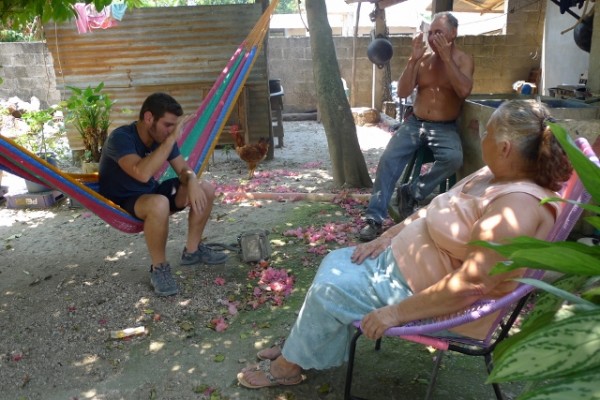
Las Cruces still sees a shocking number of girls as young as eleven impregnated. The roads are bad which limits aid and access, there are too few school and almost no books, the farming produces little variety and little more yield which keeps the economy from ever expanding. That her parents survived to have her is one miracle, but if she somehow manages to learn and grow and be a force of change and growth (like Maria), it will be a greater miracle yet.
Beside my time at the municipality, I went to visit some of the schools in Las Cruces; as a teacher it is generally the first place to which I am drawn. What I saw gripped me with an intense sadness and fear for the future. The schools were all built of concrete with tin roofs (deafening when there’s rain). For windows there are gaps in the concrete with chain-link fencing for windows. There are no books – no books! At most the teacher will have a single text book for each subject from which they read while students copy down the information. Besides not having books teachers have to find and make all the materials they want to use in the class. The eefectiveness of this is further diminished by a lack of teachers who specialized in the subject they are teaching. This is particularly true of English teachers – those who bother to master the language don’t go into teaching. Most of the teachers are just high school graduates who themselves never read a single book. That means that a recently graduated high school student will teach current high school students who wish to become teachers, reading from the same book he just finished copying, and relaying absolutely no new information onto the students… and thus the cycle continues year in and year out. It is the reason almost nothing has changed since the conquest 400 years ago. Those in poverty remain in poverty and have almost no legal way by which to escape.
Still, there are some libraries, and when I was not answering the student’s questions about the U.S and Russia and my own crazy life, I was encouraging them to read, giving them the titles of my favorite books, and doing what little I could to make them aware of the cycle in which they are stuck and giving them hope of becoming the change. It felt so good to be in a classroom again, to share ideas with bright, eager minds, of seeing hope and excitement and even a little learning. If becoming a teacher was the hardest thing I have ever had to do, then leaving the classroom was a very close second.
In the hours I was not volunteering, I sought the pure and cooling waters of the source of a river a few miles from town. Sure the flies, and ants and wasps, and gnats aren’t too pleasant, but they are more tolerable than a breezeless heat. There was nothing else that could cool the permanent state of sweat in which I was living. The jungle heat in El Peten is otherworldly. The lethargy that overcame me is difficult to describe – I was so hot and exhausted that I could barely think. I would sit in front of pen and paper and no thoughts would come, only the burning of sweat dripping into my eyes would recall me from the stupor into which I would fall dozens of times a day. The local padre took me in and gave me a room in the little cement cube adjacent to his house. We moved the sacks of corn and beans to the side and threw down a mattress. There’s electricity, and a bathroom, but the water doesn’t work right, so it’s to the bucket I go to wash myself and flush the toilet. In that little room I spent my nights tossing and turning in the heat, kept awake by the crashing of mangoes on the tin roof, and the buzzing of flies and mosquitoes around my head.
Padre
For the first month or so I couldn’t understand Guatelmateco (The Spanish spoken in Guatemala). Entire sentences rushed past my ears with often not a word understood. The form of speech sounds more like barking – quick successions of phrases that grow louder from the first word to the last – like graphs of exponential equations. I feel stupid as I look into people’s mouths, and search in desperation for some sort of context clue to help. I find myself asking people to repeat themselves, and use other words, in almost every conversation. Sometimes they do, and it still doesn’t help, at others they just repeat what they said before, and I am left nowhere.
Talking to the padre while swinging and sweating in the hammock, with eyes dried out from the dust no rain has calmed in months, the lights went out for the 3rd time this week, leaving the village in complete darkness. It was harder to see his face, and therefore harder to understand, but we don’t give up because we each feel the importance of our moment together. We laid in those hammocks for a long time, talking of the state of Guatemala, the natives, the church, education, agronomy, Italy, communism… I was hoping he would agree to host me for exactly this reason. Speaking with locals can be an interesting process: they may know well the things that occurred to them, but are often incapable of placing the events in a larger context because they know little outside their own lives. Those who have TV more often watch Novellas, soccer matches, and sometimes the news – but the news does little to teach people about what actually occurs. The padre was a local, but had traveled outside Guatemala, had been educated, and therefore was able to bring that local knowledge into the greater context of our world, which made him all the happier that I could bring a little more of the world to him.
That night was one of the worst in my life – doubled over and writhing in pain. I then took my second dose of antibiotics in 30 days. Before this, I can’t even remember the last time I took antibiotics, or had to go to a doctor – the road is a cruel mistress… but my mistress nonetheless.
I wish I could have stayed longer, but the heat made me function at a quarter capacity and I could do little good. My week volunteering at Las Cruces, however, served to remind me of how much I love volunteering and working with kids, and so I made it a point to keep my eyes open for another opportunity to do so (perhaps in a place slightly cooler and more suitable for a Russian). Guatemala and fate did not disappoint me, and the following week I was presented with the opportunity to volunteer at an orphanage. It would be the most satisfying weeks, followed by the single saddest day of my journey.
